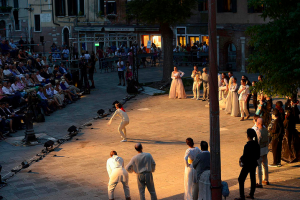VENICE AND THE GHETTO – Discomfort in Laguna
There is something very strange about experiencing The Merchant of Venice and knowing that you are somehow imaginatively implicated not only in the play’s romantic hero and heroine but also, and to an even greater degree, in its villain. You laugh when Shylock’s servant, the clown Gobbo, runs away from his penny-pinching master. You smile when Shylock’s daughter Jessica, having escaped from her father’s dark house into the arms of her beloved, declares, “I shall be saved by my husband. He hath made me a Christian.” You shudder when the implacable Shylock sharpens his knife on the sole of his boot. You applaud the resolution of the dilemma, when the clever Portia comes up with the legal technicality that undoes Shylock’s murderous plan. He who had insisted upon the letter of the law is undone by the letter of the law.
But, all the same, you feel uneasy. What exactly is it that you are applauding and smiling at? How do you view the Jewish daughter who robs her father and bestows the money on her fortune-hunting Christian suitor? Do you join the raucous laughter of the Christians who mock and spit on the Jew? Where are you, at the end of the harrowing scene in the courtroom, when Portia asks the man she has ruined whether he agrees to the terms she has dictated, terms that include the provision that he immediately become a Christian: “Art thou contented, Jew? What dost thou say?” And what do you think the Jew actually feels when he answers, “I am content.”
*Stephen Greenblatt is a professor at Harvard University. This article was published in the booklet by Ca’ Foscari University of Venice, Compagnia de’ Colombari and Committee for the 500 years of the Ghetto on the occasion of the new production of “The Merchant of Venice” performed for the first time in the Ghetto. The picture is by Giovanni Montenero.

